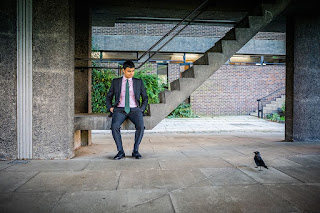Nikhil Krishnan, winner of a 2021 Pilkington Prize for outstanding teaching, says that what he loves about teaching is what he loves about philosophy: you can’t know in advance where it’s going to lead. Outside of the lecture hall he’s unravelling how philosophy came to be what it is today.
Philosophy isn’t about talking in a new language about a special class of ‘philosophical’ things. In philosophy, you talk about the everyday things we are very familiar with – like human life, love, friendship, politics – the sort of thing you’d talk about in the pub.
Anything you can talk informally about you can philosophise about. What philosophy adds is not a new subject matter but a new level of discipline. When we do philosophy, we pay scrupulous attention to what we say – because the questions are too difficult and important to be casual or sloppy about.
Philosophy is a valuable human activity with a long history which we shouldn't allow ourselves to lose. The way to do that is by making sure that we are teaching it to the highest standard of rigour. To be recognised by the Pilkington Prize feels extremely important; my sense of the value of what I do is deeply tied to what my study and teaching of philosophy does for my students.
Nikhil Krishnan at Sidgwick Site, sitting on steps, looking at crow
I’m particularly interested in a period of British philosophical history which occurred after the Second World War. During this period all the energies that were suppressed during the War were released. People were coming back with new experiences and had become a lot more worldly than the generation before them. The writings of philosophers such as JL Austin, Peter Strawson, Elizabeth Anscombe and Iris Murdoch were ambitious, exciting and creative.
At this point philosophy suddenly became a lot livelier and more in touch with human experience and politics. There was a childish, rebellious excitement in the air. Philosophers were trying to go beyond what had been said before. They weren’t deferential to their elders, but nor were they disrespectful to their inheritance. It just feels like they wanted to answer the old questions for themselves.
Nikhil Krishnan at Sidgwick Site
I’ve written a soon-to-be published book about the history of philosophy from 1920 to 1960. I hope to carry that story onwards from 1960 to the present. It will be a genealogy of present-day philosophy, an attempt to understand how the discipline came to be what it is today.
I’ll investigate how real-world politics made a difference to the philosophy taking place in universities, and how academic philosophy came to influence real-world politics. In particular I’m interested in how the rivalries between the Communist East and the capitalist West during the Cold War shaped philosophy between 1960 and 1990.
The last 60 years of world history can be told simply by looking at what philosophers were talking about – the two mirror each other. In Britain, for instance, philosophers were part of the fight against racism and debates about the decolonisation of former parts of the British Empire. In the United States, philosophers were influenced by the Vietnam War and Civil Rights movements.
Nikhil Krishnan at Sidgwick Site, sitting on steps
I hope we’ll see a wider range of people, who thought they weren’t cut out for philosophy, realising that they are and that what they have to say is valuable. It’s heartening to see that in the field of philosophy, there is an opening up of the questions, and the range of voices and experiences that go into answering them. Among the many such topics, I am particularly interested in the philosophical work on disability and psychiatry. In teaching a new generation of philosophers, I hope to be a small part of this great expansion.
Dr Nikhil Krishnan won a 2021 Pilkington Prize. Nikhil is Fellow and Director of Studies in Philosophy at Robinson College and an Unestablished Assistant Professor in the Faculty of Philosophy.
This profile is part of This Cambridge Life – stories from the people who make Cambridge University unique.
Words: Charis Goodyear. Photography: Lloyd Mann.
The text in this work is licensed under a Creative Commons





0 Comments
please do not spam link